
Your performance will be challenged
Is doing your job really getting it done?
Unless you were born and raised alone in a cave, you have been evaluated, probably thousands of times. The moment you were born someone evaluated you across 5 different axes and gave you a score comparing you to other newborns. Since then, every test, in every class, in every school you ever attended was a performance evaluation. Performance evaluations at work are just a more formalized process.
Evaluations are all about understanding expectations. Let’s face it, most of us dread those annual or semi-annual performance evaluations. But if we can get over thinking that it’s all negative criticism slinging, or a paper pushing exercise implemented by HR to justify personnel moves, we can make evaluations work for us. Evaluations are formalized feedback, a conversation, where you compare your performance to the expectations others have of you. It’s like any high school test, you pass the test - you have performed at level, you do well and you have over performed, fail the test and you have underperformed.
Performance evaluations can be very hard when expectations are unclear. Expectations are understood differently by different people. “Show the new feature to the team at the end of the week” could mean “have a couple slides of UI ready to present” or “have the code running in production”. Make sure you understand what’s expected of you, and if it’s unclear, ask.
Clear expectations can be difficult to express if there are non-quantifiable factors at play. “Give me some good code” could mean fewer lines, faster run-time, or something finished and presentable to the client. Understanding expectations set for us can be complicated if those expectations change over time and it’s not communicated well. A change in the team membership, new team goals or gaining experience over time can all change expectations. It’s also human nature to have personal relationships influence both the expectations set and the performance assessment.
Again, in high school, your first French test was vocabulary, in the next test you had to use the words with proper grammar – expectations changed. Your semester grade wasn’t just an average of tests, it may have included class participation or motivation to learn – non-quantifiable factors. Maybe your teacher bumped up your overall grade a bit because they knew you were trying hard or maybe they knew you had something going on at home – personal bias.
Make performance evaluations easier – write it down. Since performance evaluations are an assessment of performance versus expectations, we need to have both very clearly defined. Have expectations written down. They aren’t etched in stone, in fact, you should revisit them often by eliciting feedback. Written expectations allow the conversation to be thoughtful and can be a jumping point to discuss areas you’d like to grow and improve in.
Make sure the expectations are expressed clearly enough that you can derive the correct meaning. A History test on the current topic could just mean regurgitating “Louis XVI and Marie Antoinette, 1793” but, class discussion and chapter 13 means “Discuss the socio-economic factors that lead to the French Revolution.”
What do you do with your evaluation once you have it? Evaluations are essential tools that influence your future actions and determine your path going forward. But the tool only becomes useful in a bigger context. You may receive your evaluation as “n of x” score, but that doesn't give you full picture. It's in your best interest to keep track of how your evaluations change over time. The graphs below illustrate typical situations that you may experience to help you make sense of your next evaluation.
Expectations
First, a few words about the expectations. In a healthy company, expectations tend to increase over time. That's a good sign! It means that the company is growing, expects innovation, and will provide you with plenty of opportunities to advance your skills and career in general.
If you find yourself in a company where the expectations stay the same, or worse, decrease over time - look for another job. Limited expectations may feel comfortable and certainly make it easy to become a superstar, but this will harm your development in the long run.
Over-performance
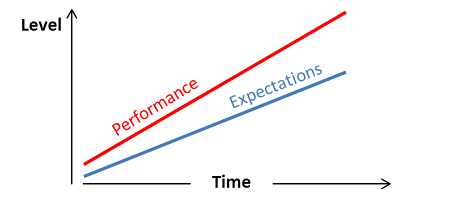
If you consistently exceed expectations, consider whether you are challenged enough in your role. Take this opportunity to discuss promotion, additional rewards or expanding the scope of your role. This will cause an increase of expectations and you won’t be so bored or become complacent. After all, your overall goal is to grow and learn.
Performance at expectations
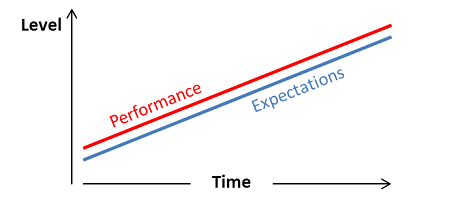
If your performance is consistently meeting expectations – great, keep at it. Consider adding some challenge, perhaps personal growth or learning, to bump up expectations a bit and give yourself some room to grow.
Under-performance
It's never pleasant to find yourself under-performing. It's crucial that you recognize when the expectations aren't met, and the size of the gap. In some cases, it's a simple matter of clarifying the expectations. Other times, you'll be better off in a place where your skills are a closer match for what's required in a given role.
Chronic under-performance
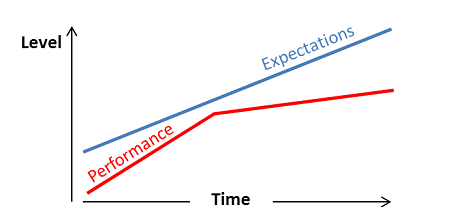
If you are consistently under-performing, it may be time to admit you have bitten off more than you can chew. Take the opportunity to discuss scaling back your role or consider a position with better fit, either within that company or elsewhere.
Sudden decrease
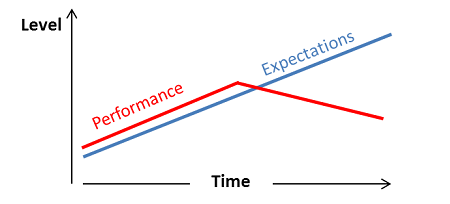
If your performance took a sudden downturn, you should identify what caused it. Determine if it’s a temporary situation and discuss options for support or your strategy for a comeback. If the situation is more permanent, you should consider a different position to fit your new situation.
Stagnation
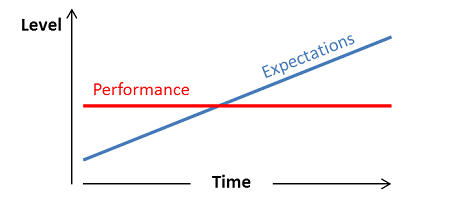
If your performance stagnates, it is important to recognize it before the delta between performance and expectation becomes too great to overcome. Discuss development to improve your performance or accept that the role has outgrown you and you need to find a new position.
Performance grows slower than expectations
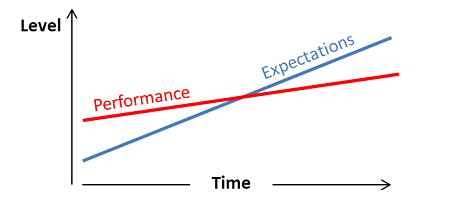
This is when your performance is increasing but not keeping pace with expectation increase. Honestly evaluate if the role has outgrown you and you need to move to a different role or if you need support to further develop such as additional training or coaching so you can again meet expectations.
Fluctuating performance
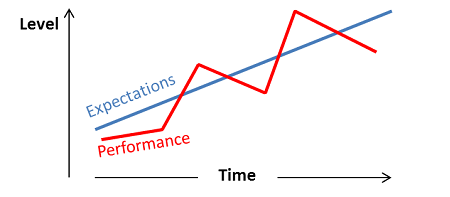
If your performance fluctuates, you need to analyze what’s happening. Is your motivation fluctuating? Are you hitting the same roadblocks again and again? Do you get support, improve for a short period but then can’t sustain that performance level? Here, each case will be different and frank communication is needed. If you agree to a permanent solution – great. If you have no agreement on a solution, it’s time to find a new position - one that is a more consistent fit for you and allows you to develop at your own pace.
Performance evaluations are a great communication tool to set goals and expectations. If those expectations are clear and well understood, you are well on your way to being aligned and staying on track. You should use your evaluations to determine your next step in the growth and development of your career. Who knows, that A in History might come in handy yet.